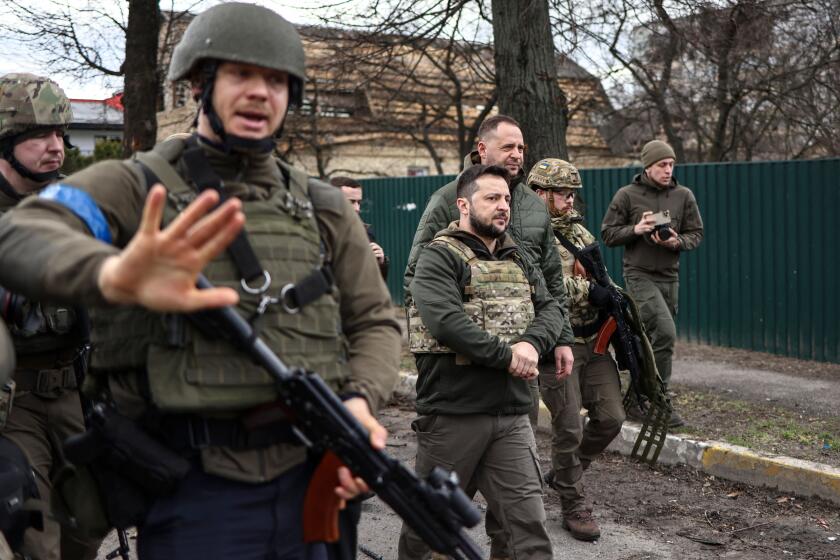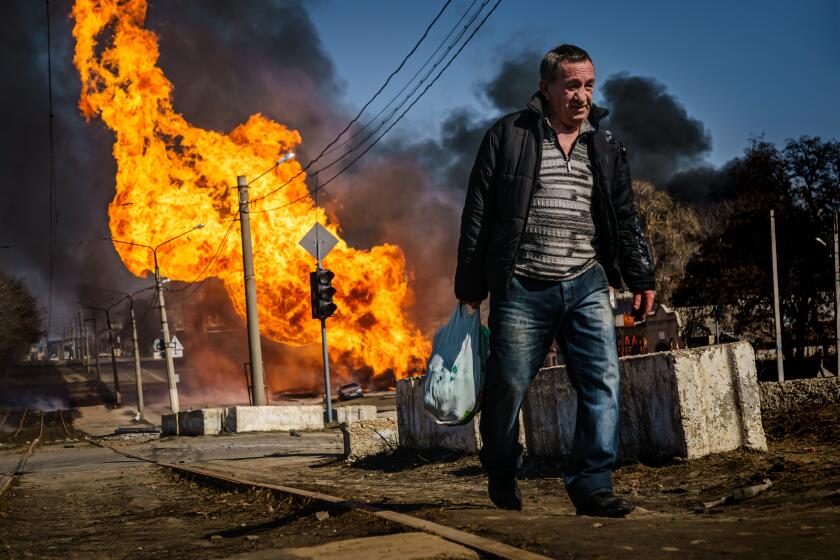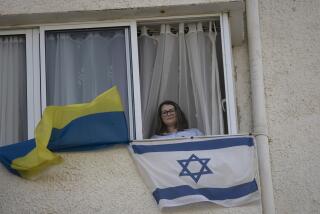Ukrainian refugees in Berlin: ‘I feel guilty being in safety’
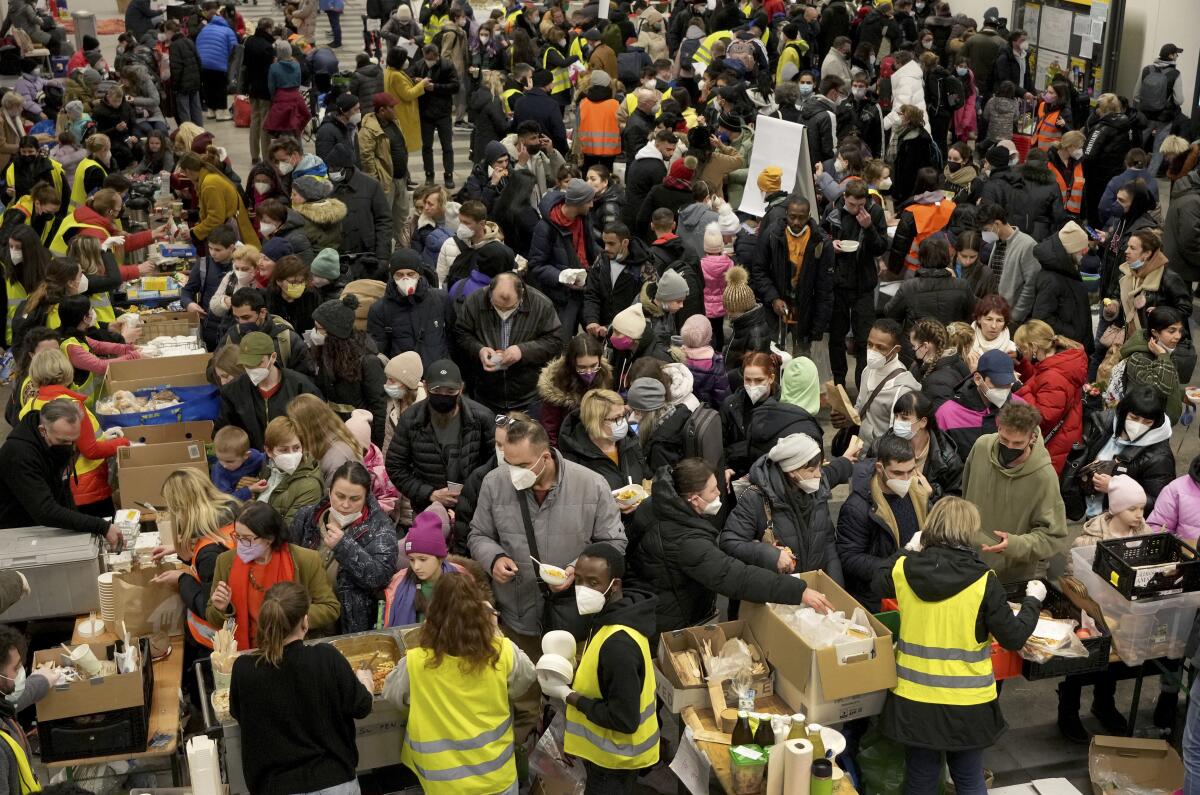
- Share via
BERLIN — Berlin central train station, lower level: This is what it looks like to be a refugee. Stacking one’s few belongings in a safe place, trying to understand what is yelled in German, Russian, Ukrainian, looking into myriads of unknown faces, worried faces, some smiling faces.
“You must be hungry,” a helper in a yellow vest asks. “Do you have a place to stay?” Nodding, thanking, having a bite. Trying to make sense of what has happened in the last two unimaginable weeks.
Like Inna. The 28-year old brown-haired woman from Kyiv still believes that all this is just a bad dream, a nightmare. She wants to wake up from this hellish misery and just do what she had done for the last three years: work as a yoga teacher in Ukraine’s capital, trying to make people feel good, trying to get people’s minds and bodies into balance.
Since the early morning hours of Feb. 24, when Russian tanks and rockets entered Ukraine, she has been, to put it mildly, thrown off balance — as have millions of others. Walking through the Berlin station, she ponders her fate and those of her countrymen. “I am thankful I can be here,” says Inna, who asks that her surname not be used due to safety concerns. “But my heart is in Ukraine.”
Like Svetlana. Svetlana, 35, is sitting on a bench and working her phone, sending messages, reading the news. She and her two children have been transferred to a welcome center in Reinickendorf, in the north of Berlin, to register and be assigned a place to sleep.
On her lap she cradles a package of food: apples, sandwiches and a carton of juice. Svetlana is waiting for friends to pick her up. Drinking and eating. During the journey to safety she and the children, ages 9 and 13, had no food, nothing to drink, she said, little chance to sleep.
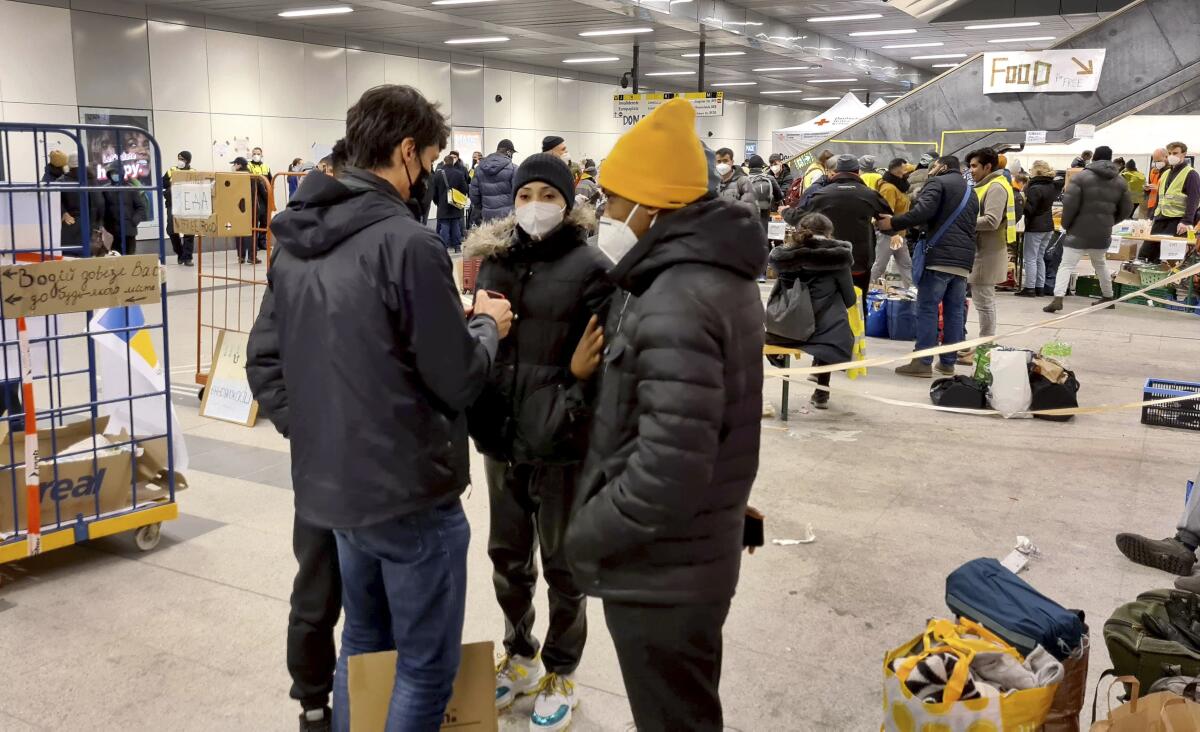
The kids got angry, desperate. Svetlana had to calm them down — although she herself was unsure of what to do. Their memories are filled with heartbreaking scenes, most of all when she and the children parted from her husband and their father, Sergey. Like other Ukrainian men, he stayed behind, expecting to fight the Russian invaders. A woman sitting next to Svetlana on the bench could not even talk about the last few days. “Don’t ask me,” she says, her eyes pleading for understanding and her voice choking with tears.
Svetlana is from Kryvyi Rih, a city in south-central Ukraine known for its steel plants. When she heard the first explosions at 7 a.m. on Feb. 24, she did not hesitate a minute. Grabbing her belongings and kids, she immediately went to relatives who live in a village an hour away.
There she waited for a week and finally returned to the city and the family’s apartment, hoping the war would spare their hometown, only to realize the next day that Russian tanks were now on their way toward Kryvyi Rih.
With thousands of others, she rushed to the station, made it on a train that brought her to west to Lviv and finally to safety in Przemysl, Poland.
“We worked our whole lives to establish an existence of our own,” she said. “And in an instant it is all gone.” She paused. “Now I am standing in line to get food.”
A woman reacts as she stands in front of a house burning after being shelled in the city of Irpin.
Each day, some 10,000 refugees arrive in Berlin. They are mostly women and children, since men of fighting age, between 18 and 60, are not allowed to leave the country. Two-thirds of the more than 2 million who have fled have entered the European Union through Poland. A majority want to stay there but many travel on. Observers assume that this is only the beginning. If the war continues, the numbers may rise dramatically, possibly soaring to 10 million, according to Gerald Knaus, a migration researcher from Austria.
Knaus believes this will be “the largest refugee movement in Europe since the Second World War.” In one week, Europe has seen as many refugees as in all of 2015 when those fleeing war came from Syria, Afghanistan and Iraq. “This is going to be a historical challenge.”
All assistance is welcome, and thus far, Germans have displayed a strong sense of solidarity with the refugees. Help comes from many quarters: Germans have opened their doors to invite Ukrainians to stay in their homes; members of the Ukrainian diaspora of more than 330,000 living in Germany have done so too.
There are also many Russians living here, ashamed of the death and destruction that Russian President Vladimir Putin has unleashed.
“I am thankful the Ukrainians arriving here in Berlin don’t put the blame on me,” a Russian volunteer says. “I can only apologize.”
Infrastructure remains in place from the previous refugee crisis, helping streamline the influx of Ukrainians. And private organizations have reacted even more quickly than official agencies.
The Times’ Marcus Yam, no stranger to war photography, gives a first-person account from Ukraine.
Diana Henniges, founder of the nongovernmental group Moabit Helps, is convinced that without the flexibility of volunteers, the situation would have gotten out of hand in recent days.
“We never know in advance how many refugees will be arriving with each train,” she says.
Since Ukrainians do not need a visa when entering the European Union, it is not mandatory to register. This is the key reason why the numbers of migrants can only be rough estimates.
“We have to admit that we have no control of the inflow of refugees,” Henniges says.
The mayor of Berlin, Franziska Giffey, sent out a distress call Friday. Berlin has had to make room for “more than 1,000 overnight places” every evening, she said. “We are at capacity.”
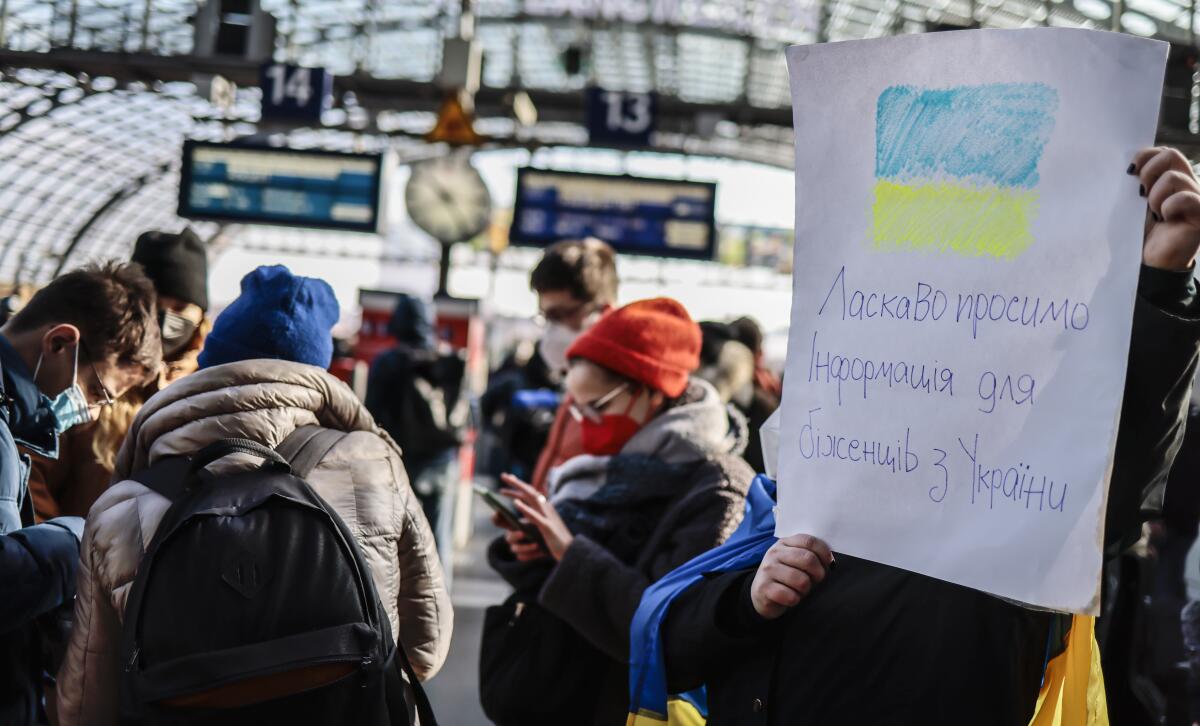
Once the bottleneck of the first arrivals has eased, analysts say, they are cautiously optimistic about the chances of the integration of Ukrainians into the German labor market.
Although refugees will not be able to work immediately because most lack the necessary language skills, their medium-term prospects are good, as they have been in the past for Ukrainians, according to estimates by the Institute for Employment and Research, known as IAB, in Nuremberg.
About half of Ukrainians have an academic degree, and many are specialized workers. In a few years, more than 50% of the refugees could find themselves in stable employment, the IAB predicts.
For years, German companies have been desperately looking for additional staff as the number of domestic-born workers has diminished. With a birthrate of 9.3 per 1,000 people, Germany ranks at the lower end of the global scale. Hopes that the migration of 2015 would ease the dire situation in the labor market have only been partially fulfilled due in part to a lack of specialized education. About two-thirds of refugees from Syria, where the majority of migrants came from seven years ago, are now living on state welfare.
Migrants from the Muslim world have not been universally welcomed in Germany, but experts said the proximity of a war only a few hundred miles away will likely make a difference. Some migration analysts criticize what appears to be a double standard but acknowledge that cultural and religious similarities may play an added role in the degree of acceptance.
Some say it is just the reality of life: “Of course, the geographical or ethnic origin of the refugees plays a role. In the current situation, I do indeed observe unequal treatment, but I do not see it as prohibited discrimination,” said Daniel Thym, a professor specializing in migration issues at the University of Konstanz, in a recent interview.
At the train station, Inna read the latest troubling news from Kyiv and how the Ukrainian capital is preparing for an expected Russian onslaught. The father of her 4-year-old son Simon is still holding out in the Ukrainian capital.
Then she declares: “I feel guilty being in safety,” before adding: “We will win this war. Not even the staunchest Putin followers in Ukraine support him anymore. Not after he brought this nightmare upon us. He is not a human being.”
Ziener is a special correspondent based in Berlin.
More to Read
Sign up for Essential California
The most important California stories and recommendations in your inbox every morning.
You may occasionally receive promotional content from the Los Angeles Times.
